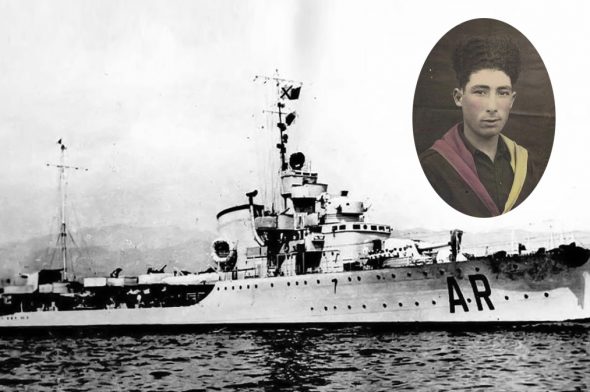From the last battle of the Artigliere to the self-destruction of the cruiser San Giorgio: interview with the daughter of Giosuè Nuscis, the sailor who survived two sinkings
His daughter, Marinella, remembers the figure of her father, rediscovered thanks to an article by Liguria Nautica

From the last battle of the Artigliere to the self-destruction of the cruiser San Giorgio: interview with the daughter of Giosuè Nuscis, the sailor who survived two sinkings
His daughter, Marinella, remembers the figure of her father, rediscovered thanks to an article by Liguria Nautica
“My father was there, in the midst of the flames and explosions on that ship whose story you told. He was a sailor, and many times, in the evenings with the family that we spent in our house in Terralba, he told us children about the tragic hours of the last battle of the Artigliere. He was obsessed. It often happened that at night he would scream the name of his captain, Carlo Margottini, and of his dead friends swallowed by the sea in front of his eyes”. Marinella Nuscis is a very kind 66-year-old lady. She was born in Terralba, near Oristano, which is also the town of origin of her father, the sailor, Giosuè Nuscis, whose story we will share.
Marinella lived for many years in Torino, managing together with her husband, an accountancy office. Having closed the business, she returned to her native Sardinia and it is from here that she wrote us to thank us for the article we dedicated to the Artigliere in Liguria Nautica. “When dad would tell me the story I confess, I didn’t listen too much. It was not the kind of story that a little girl liked to hear! He only talked about war and death. Reading your article, I understood many things that I didn’t know, connecting them with stories my father told. He was only 24 when it sank. Only now have I realized how tragic his life had been”.
What did your father tell you? “He talked about his captain, Carlo Margottini, and how he was one of the first to be killed, leaving the crew without a leader. Then he told the story of escaping through the flames and bombs, of how the ship was attacked by the enemy from the land and sky, right until the confusing moments of its sinking. The same enemy then threw into the water the life rafts for the survivors and he was able to climb into one of these. But many were unable to climb in because there was not enough space, or they were injured. Dad continued to repeat the names of his sailor friends that he saw die without being able to help them. And then the long hours, at least 25, spent in the sea without food or water, waiting for help while his fellow comrades continued to die around him without any help”.

The Sardinian sailor, Giosuè Nucis
Did your father have further war experience after this battle? “Yes, even though the sinking of the Artigliere is what affected him the most. As far as I can remember, he was on board another ship, he called it a cruiser – us children had no idea what that word even meant – with the name of San Giorgio. And then he always spoke about Tobruk and how the ship was sunk by her captain. It must have been a very disorganized operation because the captain had to go back on board the ship two times to make it explode and, even in this case, three of his friends died. Dad repeated all their names, even though I can’t remember any more”.
The San Giorgio was a cruiser that fought to defend the city of Tobruk against the eighth British fleet. Its captain, Stefano Pugliese, sank the ship before the arrival of the English on 21 January 1941, but almost the entire crew was captured. Did your father also end up in prison? “Yes. They brought him to Massaua (in Eritrea, editor’s note). He always repeated the name of this city. It must have been a terrible incarceration. Dad said they used to wash potato peels in order to cook them and eat them. Then, with three friends he was able to escape, even though they didn’t know where to go. They hid in a cellar which they found was full of cured meats and wine. They ate until they burst and all ended up drunk. This was the only funny episode he told us”.
How was your father’s life, after the war? “Dad left the sea and went to work in the mines. He spent sixteen years working in the silver mines of Ingurtosu, in southern Sardinia. In the end, like many other minors, he contracted silicosis. He died at only 69 years old. My brother and I took shifts at the hospital. I was there when he died. It was a moment I will never forget. In his hospital bed, my father kept calling the name of his captain, Margottini, asking him to save him”.
Topics: Artigliere



